#kj charles
Text
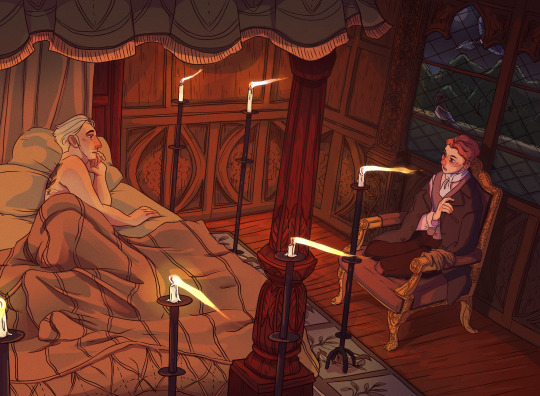
"He set up the wards around Crane's bed. To the unskilled eye, it looked simply like a ring of lit candlesticks, until Stephen suddenly looked up from five minutes' intense concentration and all the flames simultaneously bent sideways, streaming out, as through in a circle of moving air."
-- The Magpie Lord
607 notes
·
View notes
Text
let's be more positive about books for a while! here are some queer historical romance novels that i've been rereading recently that i think do something interesting with making characters feel historical in their mindset and worldview, but are also fairly progressive, diverse queer books that are, frankly, a delight to read
this is by no means exhaustive and to be honest i could put almost anything by cat sebastian or kj charles on a list like this so this is purely the highlights of what i've reread in the past week to take my mind off work, and why i think they're interesting from this specific angle
cat sebastian, the ruin of a rake (turners #3)
this is technically the third in a trilogy but they're only very loosely connected, so you don't need to have read the others if you don't care about knowing who all the background characters are. the others are also good though
why it's interesting: features a character who has had to painstakingly study and learn the rules of polite society in order to claw his way up to respectability, and is now deploying those skills to help another man repair his reputation. shows the complexity of those rules, the social purposes they serve, and the work that goes into living by them, as well as the consequences of breaking them. also explores some of the financial side of aristocracy, and features a character with chronic illness (recurring malaria following repeated infections as a child in india) whose feelings about his illness are very relatable without feeling overly modern.
kj charles, society of gentlemen series.
this trilogy is closely related plot-wise and best read in order. all three explore cross-class romances and characters struggling to reconcile their political views and personal ethics with their desires, in the aftermath of the peterloo massacre, with a strong focus on the political role of the written word. first book is long-lost gentleman raised by seditionists / fashion-minded dandy teaching him to behave in society; second book is tory nobleman submissive / seditious pamphleteer dominant who've been fucking for a year without knowing the other's identity; third book is lord / valet and all the complicated dynamics of consent there with a generous side-helping of crime.
why they're interesting: close attention to the history of political printing and the impact of government censorship and repressive taxes on the freedom of the press; complex ideological disagreements that aren't handwaved as unimportant; examination of trust, consent, and social responsibility across class differences and in situations with problematic power dynamics; most of the characters are progressive for their time without feeling like they have modern attitudes. the second book, a seditious affair, deals most strongly with the revolutionary politics side of things, but all tackle it to some extent.
kj charles, band sinister.
look i'm probably biased because this might be my favourite KJC. it's a standalone about a pair of siblings: the sister wrote a gothic novel heavily inspired by their mysterious and scandalous neighbour whose older brother had an affair with their mum (causing scandal); the brother is a classics nerd. the sister breaks her leg on a ride through their neighbour's estate and can't be moved until she heals so they both have to stay at the house and find out if the neighbour is really as scandalous as he seems.
why it's interesting: discussion of atheism and new ideas about science and creation (very shocking to the brother, who is the viewpoint character); details of agriculture and estate management via main LI's attempt to grow sugar beet, as well as the economics of sugar (including references to slavery); "unexpurgated" latin and greek classics as queer reference points for a character who nevertheless hasn't quite figured out he's queer; material consequences of society scandal
bonus: wonderful sibling dynamic and a diverse cast including a portugese jewish character, which i don't think i've seen in a book before
i will add to this list as i continue to reread both of their backlists! (bc i have read them all enough times and in close enough succession that they blur together in my head unless i've read them very recently)
123 notes
·
View notes
Text
Fave Five: Historical F/F Romance
Feminine Pursuits and Hen Fever by Olivia Waite
Don’t Want You Like a Best Friend by Emma R. Alban
The Spinsters of Inverley by Jane Walsh
That Could Be Enough by Alyssa Cole
A Little Light Mischief by Cat Sebastian
Bonus: For cozy mystery/romance mashup, check out Proper English by KJ Charles
Double Bonus: These are all realistic fiction, but for historical fantasy, try Heather Rose Jones’s…

View On WordPress
#A Little Light Mischief#Alpennia#Alyssa Cole#Cat Sebastian#Don&039;t Want You Like a Best Friend#Emma R. Alban#Heather Rose Jones#Jane Walsh#KJ Charles#Olivia Waite#Proper English#That Could Be Enough#The Spinsters of Inverley
67 notes
·
View notes
Text
So what I'm learning from all these KJ Charles books is that one should never attend a house party while single. You'll meet the love of your life but at what cost
226 notes
·
View notes
Text
Keep thinking about that one KJ Charles interview where she's talking about the challenges of being a historical romance novelist when you sort of believe the whole aristocracy should've been executed, and the delicate balancing act of writing historically accurate and interesting characters who don't have awful politics and values. And, crucially, she challenged the typical rich love interest idea by asking, "But where does the money come from?"
Once you think about it, you can't stop thinking about it. Every historical romance I read now, I can tell whether the author has thought about it. Sometimes they've thought about it but tried not to deal with it and hoped we wouldn't notice that the rich aristocrat probably owns a plantation. Sometimes they've actually dealt with it. And sometimes they have not considered it and It Shows.
But I also don't want historical novels where characters have modern sensibilities! I want them to feel historical... I just also want the "desirable" characters to not be, you know, involved in the slave trade or whatever, because that seriously undermines everything the book is doing to make them seem attractive. (One does not generally read this flavour of historical romance for morally grey antiheroes, and even if you did, that would be a fairly tasteless way of developing such a character, imo.)
I really enjoyed a detail in one of Cat Sebastian's books where the love interest is a Quaker, and he refuses dessert because he's boycotting sugar. It's a way of signalling to us that this character has particular values, but one that's rooted in the historical context and doesn't feel like a modern character wearing period clothing. His Quakerism also influences a few other details – his use of first names rather than titles, for example – but it's not a major plot point and he's no intense political campaigner. It's just one facet of his character, and one that made me like him more.
This sort of thing becomes a problem, too, with medieval settings and retellings and anything where you start having to deal with kings. A king of some tiny little pseudohistorical country whose major concerns revolve around not getting invaded and ensuring his people survive the winter is a very different prospect from a king intent on conquering his neighbours and expanding his glorious kingdom, of course. Still a king, though. What do you do with that, if you're someone who doesn't approve of kings?
I ran into this problem with a book I was working on a few years back, and it's one of the reasons I shelved it. I was trying to write a book about community and friendship. I was also trying to write an Arthurian retelling. And while a brotherhood of knights is a great starting point for a story about community and friendship, in order to have knights, you need to have a king for them to pledge fealty to. Problematic. My Arthur figure did not believe in hierarchy, but the story demanded that he perpetuated one anyway, because it was baked into the building blocks of story I was using to build mine. Eventually I realised I could not write that story as an Arthurian retelling without stripping it of everything recognisably Arthurian, and set it aside to be remade into something else.
I still think about this, though. I think about my Bisclavret retelling, which by necessity has a king in it. Bisclavret is a story about feudal loyalty, about oaths, about hierarchies. Take that away and you no longer have Bisclavret; it is a story that cannot exist without a king for the knight-wolf to be loyal to. Does that mean that as a story it always inherently supports a monarchist ideal, though? Or is its portrayal of kingship (a relationship that is, crucially, reciprocal) sufficiently detached from colonialist systems of monarchy to be distinct from those?
What systems and ideals form the assumptions a story is rested on? What happens once you start to question them? Can you still tell the same stories once you ask where the money comes from, or why the king is owed loyalty? Or does there come a point where you realise there are ideas woven into the very fabric of those narratives that you can't see past?
I don't have answers. I'm just thinking aloud. Thinking about having written a book with a king who isn't the bad guy, and what that means when I approve of neither kings nor hierarchies in general. Thinking about writing the past with the eyes of the present. Thinking about the unexamined assumptions in so many historical novels I've read, and how it feels as a reader not to be able to stop examining them.
(I have also read a number of contemporary romance novels where, after working my way through half an author's backlist, I've been forced to acknowledge that despite everything, the author does in fact think rich people are inherently attractive. Not sure what the solution to that one is, but it's certainly a different, if related, problem.)
199 notes
·
View notes
Text
less romances novels with third act drama consisting of contrived break-ups due to silly miscommunication, more romance novels with third act drama where one of the main characters is kidnapped due to supposedly knowing the location of a secret stash of ten thousand stolen guineas and gets rescued by his cool smuggler boyfriend
#pie says stuff#pie reads#the secret lives of country gentlemen#kj charles#books#EXCELLENT romance novel honestly a new favorite#marshes! smuggling! family drama! romantic walks to look at beetles!#what else could you want in a book honestly
296 notes
·
View notes
Text
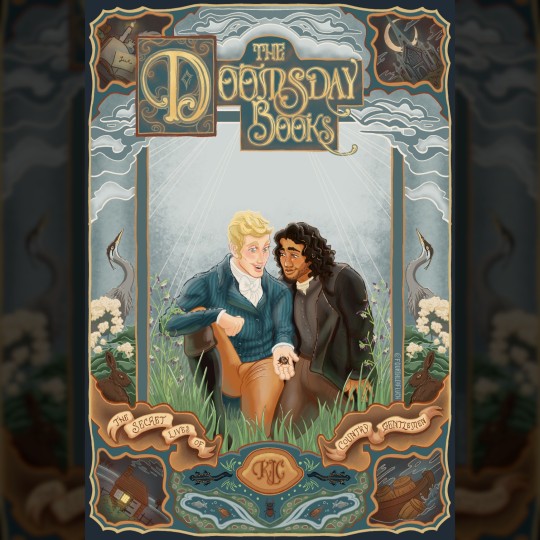
Me and the smuggler prince I pulled with my sincerity and childlike wonder
OR
Me and the baronet I pulled with my roguish charm and sense of whimsy
Queer Book Draw Challenge 17/20: The Secret Lives of Country Gentlemen by KJ Charles
(details under cut)

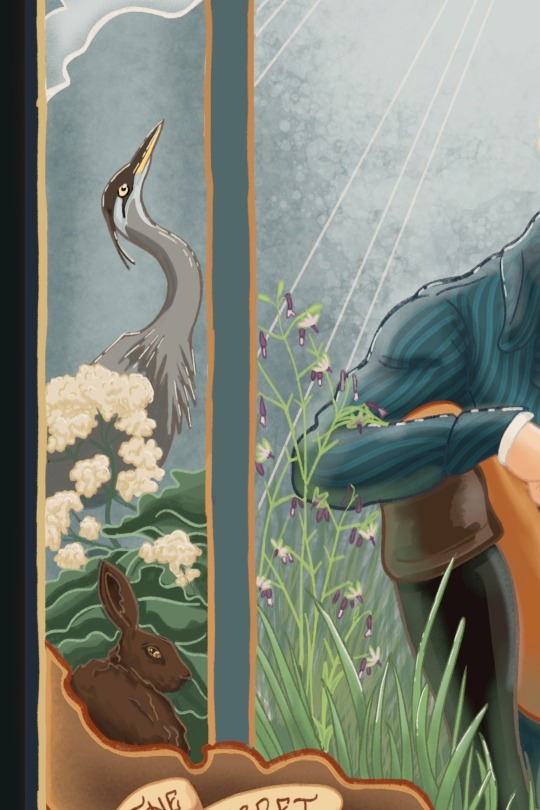

#queer book draw challenge#qbdc#kj charles#the doomsday books#joss doomsday#sir gareth#the secret lives of country gentlemen#queer books#queer romance#queer historical romance#lgbt books
96 notes
·
View notes
Text
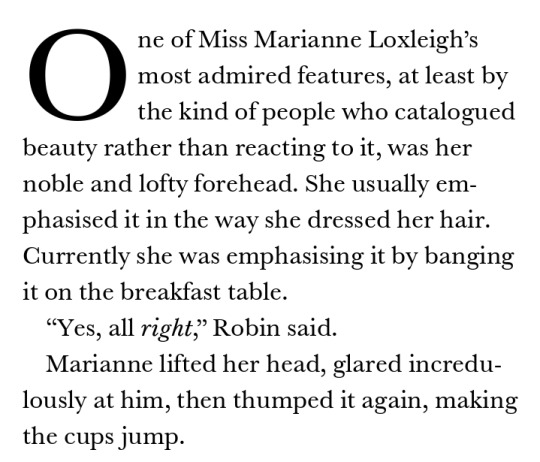
Lmaoooooo
#the gentle art of fortune hunting#kj charles#crack#writing#funny#knee of huss#queer historical fiction#queer historical romance
37 notes
·
View notes
Text

Drew more book fanart! Here's Gareth and Joss, from The Secret Lives of Country Gentlemen by KJ Charles💕💖
I just finished reading the sequel (A Nobleman's Guide to Seducing a Scoundrel) and AHHHHH all these boys live in my heart, their story was so astounding!! I loved Gareth & Joss, then also Luke & Rufus all sosososo very muchhh 🥺🥺💕✨
If any of y'all are like me and love historical romance, you don't wanna miss out on these!!
58 notes
·
View notes
Text
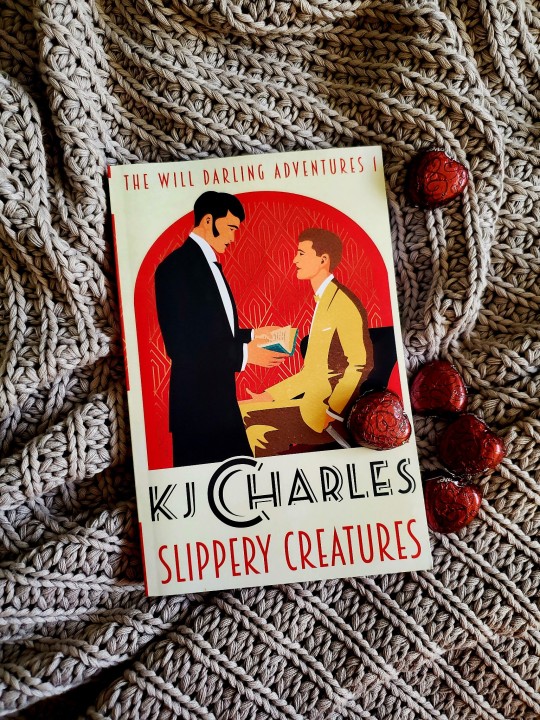
JOMP BPC || April 1 || Books and Chocolate:
Slippery Creatures by KJ Charles
#Slippery Creatures#KJ Charles#The Will Darling Adventures#jompbpc#justonemorepage#book photography#book photo challenge#books#Not out of void but out of chaos
35 notes
·
View notes
Text

Characters I’d love to lock in a room together and observe from a distance (top to bottom, left to right): Nicky Rook from “Death in the Spires”, Kim Secretan from “The Will Darling Adventures”, Daniel da Silva from “Think of England”….and technically also the will darling adventures I guess,, and last but not least - anachronistic grandpa Julius Norreys from “A Society of Gentlemen”
In other news: Ive got the KJC brainworms. again.
#kim secretan#the will darling adventures#kj charles#julius norreys#A society of gentlemen#asog#Nicky rook#death in the spires#daniel da silva#think of england#The tension in the room would be high not only bc daniel is kims toxic employer#But because they cant win in a battle of wits between each other#And a brawl would eventually break out#Which canonically only Julius can win
26 notes
·
View notes
Text
The stratification (in marketing at least) between "grimdark" crime fiction (inc books) and "cosy" crime fiction grates on me sometimes, because I like nothing that's at either extreme. I don't want relentless pain (and I find both organised crime and serial killer plots pretty boring unless they're really well-handled), and I don't want cheerfully callous "ooh, the bodies are piling up! how inconvenient! have another slice of Victoria sponge!".
I want humanity and compassion and humour and treating deaths like they do actually matter even when they're of awful people, thank-you-so-very-much. I want the satisfaction of a puzzle solved. I want an awareness by the author that yes the human fascination with murder mysteries (going right right back to Oedipus Tyrannus etc.) is kind of odd, while also not apologising for it. I want characters I warm to and care about, even if I sometimes want to throw things at them. I want a predictable structure to some extent, because it helps my autistic brain when I'm having a rough time (see also romances!). If at all possible I like at least some awareness that there is structural oppression in the world and that capital punishment is Not Great even if by the very nature of the genre (especially in police procedurals) I never expect murder mysteries to have the same politics or morality as me[1].
Some of the murder mysteries/crime fiction I do really love: the Cadfael books, Endeavour, the Lord Peter Wimsey books, the Ruth Galloway mysteries, the Discworld Watch books, the Ian Rutledge mysteries, and every time KJ Charles or T Kingfisher get a bit murder mystery on us. And so on and so forth. There are a good number! And a fair variety in tone in all of these they just... still all operate in that blessed middle space between grimdark and cosy, and involve Caring About People, and I just wish there were even more. <3
(Do recommend your own favourites if you wish!)
[1] In real life, I am very much of the opinion that ACAB, that prison is a horror, that capital punishment is one of the greatest evils there is, and that retributive justice in general is wrong and unhelpful; those views affect which murder mysteries I like and how I read/watch/listen to them to some extent but, well, fiction is not reality. And being aware of that gap helps me to keep true to my views while still enjoying stories that go very much the other way!
#the cadfael mysteries#itv endeavour#lord peter wimsey#brother cadfael#ruth galloway#elly griffiths#sam vimes#gnu terry pratchett#kj charles#t kingfisher#ian rutledge
41 notes
·
View notes
Text
Will Darling/Kim Secretan:

32 notes
·
View notes
Text
(approaching a gay couple in a kj charles book)
"so which one of you is the streetwise commoner and which one is the nobility that wasn't meant to inherit?"
37 notes
·
View notes
Text
You haven't lived until you've read An Unsuitable Heir and experienced the secondhand embarrassment of a (wonderful, well-intentioned) man asking the nonbinary person that he's actively about to have sex with "what are your pronouns and how do you identify" in awkward-ass 1800s terminology that he can barely even articulate
#he's too distracted by their luscious hair#i love this book#pen's maybe my fave character in sins of the cities#along with clem#kj charles
63 notes
·
View notes
Text
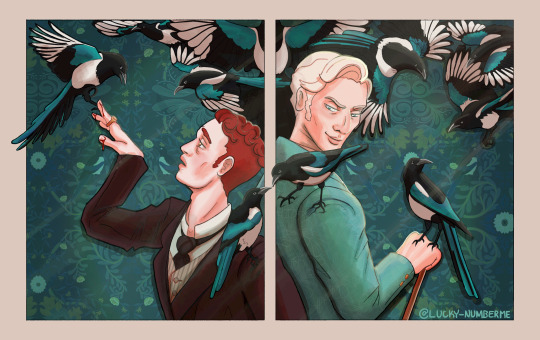

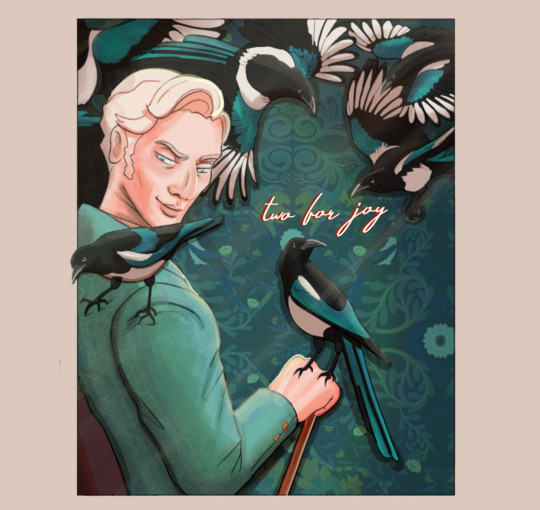
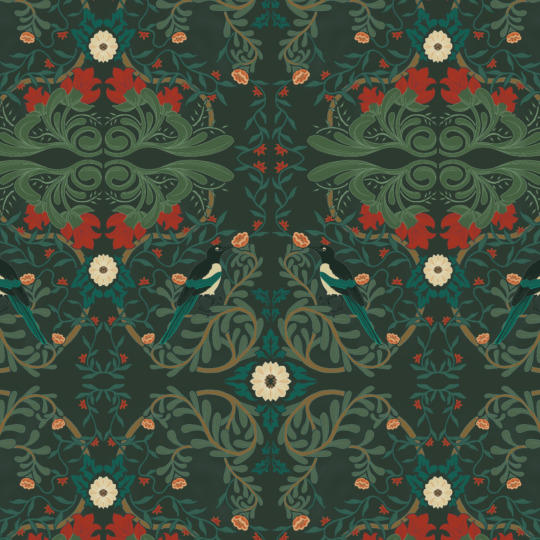
Obsessed with their dynamic tbh. If, like Lucien, the tiredest and most righteously angry man in the world saved my life and exploded people with his mind, I would also immediately fall in love
Queer Book Draw Challenge 7/20 The Magpie Lord by @kjcharleswriter
[ID: Image 1: Two side by side illustrated portraits of Stephen Day and Lucien, Lord Crane from The Magpie Lord standing back to back. It is colored in dark turquoises and shocking reds. On the left, Stephen lifts a hand to a magpie in flight. The Magpie Lord's ring shines on his hand and blood drips from under his nails. On the right side, Lucien grips a cane and turns smirking towards Stephen. A magpie is perched on his hand. Behind both of them are magpies in flight. There are 10 magpies in total. An intricate floral wallpaper also featuring magpies is present in the background. Two of the magpies are perched on their shoulders, curiously leaning across the frame towards each other.
Image 2 is a close up on the portrait of Stephen that reads "one for sorrow" in a looping script. Image 3 is a close up of Lucien's portrait overlaid with texts that reads "two for joy." Image 4 is a close up on the wallpaper print. End ID]
Commissions Open
#queer book draw challenge#little museum#magpie lord#the magpie lord#charm of magpies#stephen day#lucien vaudrey#kj charles#queer books#book art#book fanart#historical romance#queer romance#magpies
89 notes
·
View notes